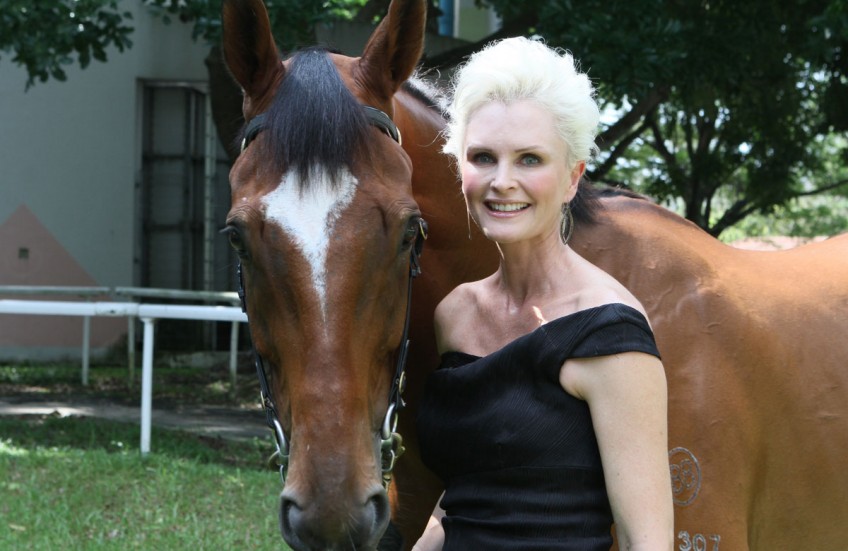Syndication, prize money making owning horses attractive with S'poreans, expats

Horse ownership is fast gaining popularity here among locals and expatriates alike, thanks in part to racehorse syndication, unrivalled prize money and the spending power of horse owners.
The trend is perhaps the starkest in the racing scene: The population of racehorses kept in the stables of the Singapore Turf Club (STC) has doubled from 700 in 2007 to 1,430 today.
The growth in ownership has been helped along by racehorse syndication, under which individuals in a group buy shares in a horse and split the monthly costs and racing prize money among themselves.
This year alone, racehorse syndication company Premier Racing Partnerships (PRP), where shareholdings can be as little as 1 per cent, has introduced 150 new horse owners to the racing community.
In under four years, PRP's list of owners has gone from seven to more than 800, its managing director Wade Burridge told The Business Times.
About 60 per cent of racehorse owners are Singaporean. Among international owners, Malaysians make up the largest number, followed by Australians and New Zealanders.
Affordability is one of the biggest draws for Singapore horse owners. Purchase prices vary, but the STC caps the monthly training fee for racehorses at $2,750, excluding extra charges for specialised services and care.
Owners of Singapore-based racehorses receive a $900 rebate per horse from STC, subject to qualifying criteria, each time the horse races. This goes into offsetting the monthly training bill.
The basic monthly maintenance expenses for polo ponies, competition horses and riding horses is slightly lower, at about $2,500.
"Singapore is among the most affordable places in the world to own and race a horse," STC said.
The attractive prize money when a horse wins a race adds to the appeal of ownership. The price purse in Singapore averages at $75,000 - several times more than in Australia (A$12,000 or S$12,443), New Zealand (NZ$7,000 or S$6,455) and the UK (£3,000 or S$6,364), Mr Burridge said.
Business owner Dennis Seow's four racehorses here have won $110,000 in prize money in the past year, for instance.
New Zealand supermodel Kylie Bax, who breeds thoroughbred racehorses, told BT: "Horse racing is known as the sport of kings, but now anyone can be a king for a day."
She also lauds syndication as a way of networking. Regardless of shareholding, owners come together to experience the exhilaration of racing and the glitz and glamour of a race.
OWN S'PORE-BASED HORSES
STC allows overseas individuals to own Singapore-based racehorses. Malaysian businessman Ronald Shim, for example, remotely owns shares in three racehorses in Singapore and receives weekly video updates on them from PRP.
On the polo front, the Singapore Polo Club has recorded a 5 per cent yearly increase in its number of horses.
Club president Rickard Hogberg said owners at the club tend to be well-heeled, with a third being expatriates. Prices of polo ponies range from $5,000 to $100,000. Higher spending power and a move towards a greener lifestyle have also contributed to the rise in horse ownership, he said.
The Equestrian Federation of Singapore (EFS) has also noticed a growth in the number of riding and competition horses here.
Local owners at EFS have also grown in number in the past few years, with most of them being Singapore Team and development team riders, said Ms Monique Heah, the EFS honorary secretary.
She credits the higher ownership within equestrian sports to promotional efforts by EFS; the federation has a public riding programme and pony roadshows. Singapore's success in equestrian sport in the last two SEA Games has also boosted its popularity, she added.
Thanks to the rise in horse ownership, Singapore is angling to become a global leader in horse racing and equestrian sport. The Singapore Polo Club, for example, has its eye on playing at the highest level in Asia and in the top games in England.
STC is holding fewer races this year to focus on boosting the quality of races instead; increased participation and competition in horse racing will encourage owners to buy better quality horses.
Mr Hogberg advises first-time owners to consider where to stable their horses and the quality of instructors and veterinary care the animals receive. For racehorses, STC's horse ownership department can help with queries.
Potential owners must also make sure they can commit the time because "a horse is for life", Ms Heah said.
Racing can be lucrative, but its volatile nature should also not be ignored. Horses can get injured, and luck is a big factor, but that is also what makes racing exciting, said Ms Bax.

This article was first published on June 21, 2015.
Get The New Paper for more stories.